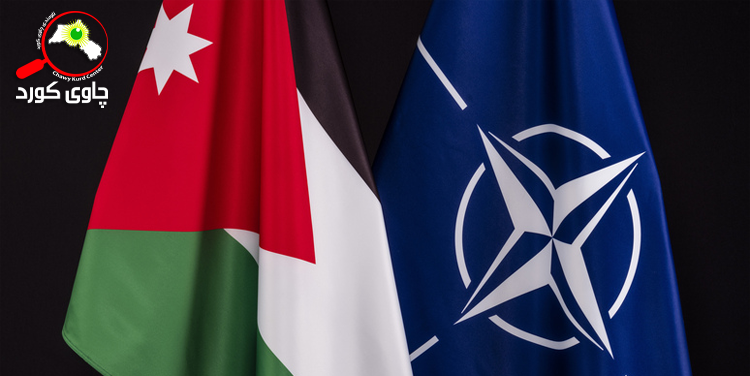In 1949, the North Atlantic Treaty Organization, also known as NATO, was established. NATO complemented the Marshall Plan (1947) and the Truman Fourth Point Program (1949) announced by the United States to surround the Soviet Union and prevent the spread of communism to the so-called Third World countries and even Europe itself. NATO was originally founded by 12 countries and is now expanding to the Middle East, with Jordan becoming the first country in the Middle East (apart from Turkey) to open an office. Jordan’s geographical and geopolitical location and role as a peaceful and stable force in the Middle East are the main motivations for the decision, which was discussed at the NATO summit in Washington. NATO’s first office in a non-NATO ally will be opened in Jordan. The decision stems from Jordan’s strong strategic relationship with NATO member states, which dates back to 1996; this year’s NATO summit highlighted Jordan’s importance in the fight against terrorism.
In the same time, the opening of the office aims to counter geopolitical challenges, enhance military cooperation, share intelligence and closely manage crises that constantly arise in the Middle East apart from the conflict between the United States, Russia and China in this strategic region such as Iraq, Syria, Yemen, Lebanon, Bahrain and Palestine. However, although NATO supports Jordan, the arrival of the NATO base in Jordan is likely to increase worries of Iran and Iranian armed groups about Jordan. This is despite Russia’s concerns about NATO’s approach to the Syrian border. Though, NATO’s decision stemmed from a number of factors that will be highlighted in this brief article.
First; US role in NATO decision
Although the decision was announced during the 2023 NATO summit in Lithuania, but after the October war between Hamas and Israel, more being emphasized and this year’s NATO summit discussed the importance of opening a NATO headquarters in Jordan, due to Jordan’s neutral status in the Arab world coordinated with various regional actors. Another important reason for opening the office is that Jordan is a strong partner of the United States, with which they have strong military, economic and diplomatic cooperation in the Middle East since the establishment of diplomatic relations since 1949. In addition, US financial assistance to Jordan has increased significantly in recent years, providing $1.45 billion annually in economic and military support to Jordan until 2029.
Second; NATO headquarters in Jordan
The decision to open NATO headquarters indicates that NATO has found a credible Arab ally in the region. However, Jordan does not have much revenue, especially in evolving its military capabilities, so Jordan can benefit from this assistance by benefiting from military training, financial and logistical assistance and how to fight terrorism-related challenges. What is clear is that the Jordanian armed forces are receiving a lot of additional technical support and advanced technology from NATO.
Third; Geopolitical Consequences on the Middle East
NATO’s arrival in Jordan will not only have consequences for the country, but also a series of regional consequences such as:
- Possibility of increasing regional tensions: – NATO’s presence will certainly raise concerns of some neighboring countries, especially Iran and Syria, which may see this as an expansion of Western influence.
- Arab public opinion: NATO’s presence could provoke a public reaction in Jordan and Arab countries, where anti-Western sentiment is strong, especially regarding the Palestinian issue and military intervention in the region. However, public opinion is weak and mostly temporary, and because the Middle East is full of rapid change, this anti-Jordan opinion may suppress itself after a while.
- Threat to Iran: Iran realizes the opening of a NATO office as a violation on its interests and a threat to its regional influence. This could lead to increased and potentially escalating tensions between Iran and Jordan, where tensions will most likely not stop between them and extend to other regional powers.
- Impact on the Jordanian-Palestinian issue: The opening of NATO headquarters could pave the way for US efforts to pressure the Palestinians to allow NATO troops to enter Gaza as peacekeepers. While the opening of a NATO headquarters in Jordan is aimed at enhancing security, the implications for the Jordanian-Palestinian issue are complex and multifaceted.
- Strategic Alignment with Israel: – Jordan’s partnership with NATO and its own alignment with Western interests, in line with Israeli security concerns about Iranian influence in the region. This could have significant implications for rapprochement and coordination between Jordan and Israel on security matters.
- Geopolitical Impact on Russia and China: The establishment of the headquarters indicates the strengthening of NATO’s hegemony in the Middle East, may be perceived by Russia and China as a challenge to their interests in the region. Enhancing NATO’s military cooperation with Jordan could complicate Russia’s strategic objectives, particularly with regard to its intervention in Syria and its support for the Assad regime. China is likely to enhance diplomatic and economic ties with regional partners to maintain its influence. Both Russia and China may seek to strengthen their alliances with countries opposed to NATO’s presence in the region.
Summary
- While a NATO office in Jordan could enhance geopolitical competition in the Middle East, it is unlikely to shift the balance of power in the short term. Especially countries such as Russia, China and Iran will not be indifferent to this security change.
- A NATO office in Jordan is likely to reinforce existing hostilities with Iran while solidifying increased security cooperation among parallel Western states in the Middle East.
- NATO’s presence may shift the balance of power in the region, potentially isolating Iran and undermining its effectiveness. This could lead to increased tensions as Iran views NATO participation as a direct threat to its interests.





























































